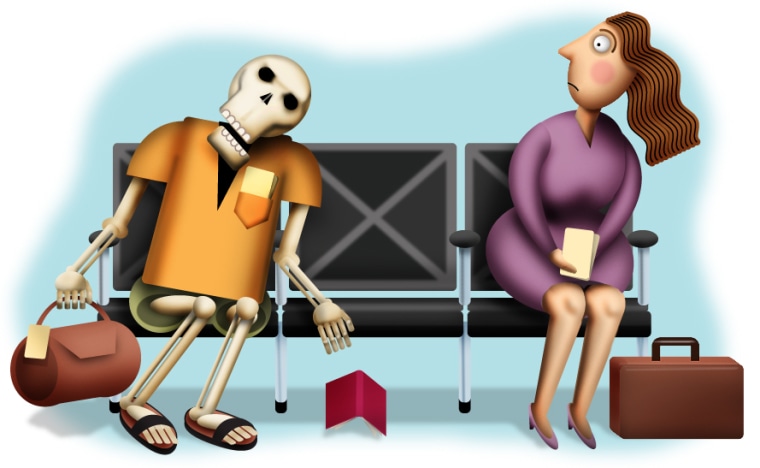Sometimes a little bit of courtesy, communication and a bit of luck can make a big difference when you're stuck at the airport.
I always enjoy spending a little extra time hanging around the airport before a flight. It gives me a chance to explore, shop and get some work done. But last week at McCarran International Airport in Las Vegas, an extra nine hours was really way too much. Even for me.
How I ended up with that extra nine hours is an all-too-familiar story. I showed up early for a 2 p.m. flight that was delayed for several hours before officially being canceled. A creeping delay on my rescheduled 9 p.m. flight pushed the actual departure time back to sometime around 11:30. I didn't make it home until 3 the next morning.
Irritating for sure, but as any frequent traveler knows, not at all that unusual.
However, I'm happy to report that there were plenty of diversions on the ground to help make that idle time bearable. I had a good, long book to read. And there were plenty of other delayed travelers all too happy to sit around and chat. Amenity-wise, McCarran offers free wireless Internet access, free power charging stations with attached work spaces, and a top-notch aviation museum with bonus display cases scattered about. I discovered that several candy stores hand out generous free samples of fudge and, oh yeah, there are slot machines pretty much everywhere you turn. And unlike the casinos on the Strip, there's no smoking allowed inside the airport.
McCarran International Airport is also the only U.S. airport with a gym inside the airport. (Several other airports have fitness centers at their on-site hotels.) 24 Hour Fitness has had a branch at the Las Vegas airport for almost seven years now. That's where I met a U.S. Airways customer service agent who regularly uses the time between her split shifts to work out. “It not only helps me stay healthy,” she told me, “Working out helps me lower my stress levels. That means I can stay cool when I'm trying to help angry passengers. Folks can get testy and sometimes downright abusive with customer service agents when there are delays at the airport.”
The folks who run the nation's airports already know this. No one really wants hordes of grumpy people hanging around an airport or strapped in their airplane seats going nowhere. And no one wants a repeat of the December 2006 storm that left close to 70 American Airlines flights stuck on the tarmac at Dallas/Fort Worth International Airport (DFW) or a rerun of last year's Valentine's Day snowstorm that stranded JetBlue planes at New York's Kennedy International Airport.
It's just not good for business or for anyone's bottom line.
That's why more than 100 officials from airports, airlines, aviation industry groups and government agencies recently got together at a workshop in Washington, D.C. Their goal: to brainstorm and swap strategies about how to keep delays from turning into disasters during those “irregular operations” when passengers end up stranded on airplanes or at airports because of weather (fog, blizzard, hurricane, tornado, etc.), security issues, air space congestion, UFO sightings, holdups caused by maintenance problems or a host of other issues.
“Customers don't care who's at fault when there's a bad experience,” was the way one workshop attendee summed it up. “They just want someone to fix it.”
So what strategies did they come up with? Well-Mannered travelers will be happy to know that courtesy and communication topped the list.
According to workshop conveners at the North American branch of the Airports Council International (ACI-NA), “Participants committed to ensuring that passengers ... are supplied with information and amenities that will help address their unique needs and make their waiting period more comfortable.”
Contingency plans discussed ranged from making better use of available technologies to share information with passengers to making sure shops and restaurants stay open longer when flights are arriving late or when passengers have to spend the night inside the terminal. The group also talked about how airports can do better by helping stranded travelers find hotel rooms and by offering free wireless Internet access, cots, blankets and basic personal hygiene products. Other support services for elongated delays included making sure extra chaperones were on hand for unaccompanied minors and that pet owners could find places where their furry friends could go to the bathroom.
The folks from DFW shared some of their solutions, which include keeping better track of how long airplanes spend waiting in hold lines on the ground and ensuring that airport shops and vending machines stock medicines, diapers, wipes, formula and other items customers may need during a delay. Other airports reported on their success with radiant de-icing, an infrared system that may be faster and cheaper than the current chemical systems currently in use at most airports.
This all sounds promising and quite doable, doesn't it? But I'm left wondering: just who should get to declare when a delay officially becomes an “irregular operation”? During my nine extra hours at Las Vegas International Airport, the wait definitely became “irregular” for one woman with a three-year-old in tow somewhere around hour four, when her reserve of diapers and patience ran out.
For me, I got perilously close to hitting the wall around hour eight. I'd finished my book, polished off a few truly unnecessary snacks, and lost a good deal of cash in those darn slot machines.
But my luck hadn't run out. The customer service agent who rebooked my flight turned out to be the stress-free woman I'd chatted with in the gym. When I finally did get on the plane for my flight home, I discovered that I now had a first-class seat.
